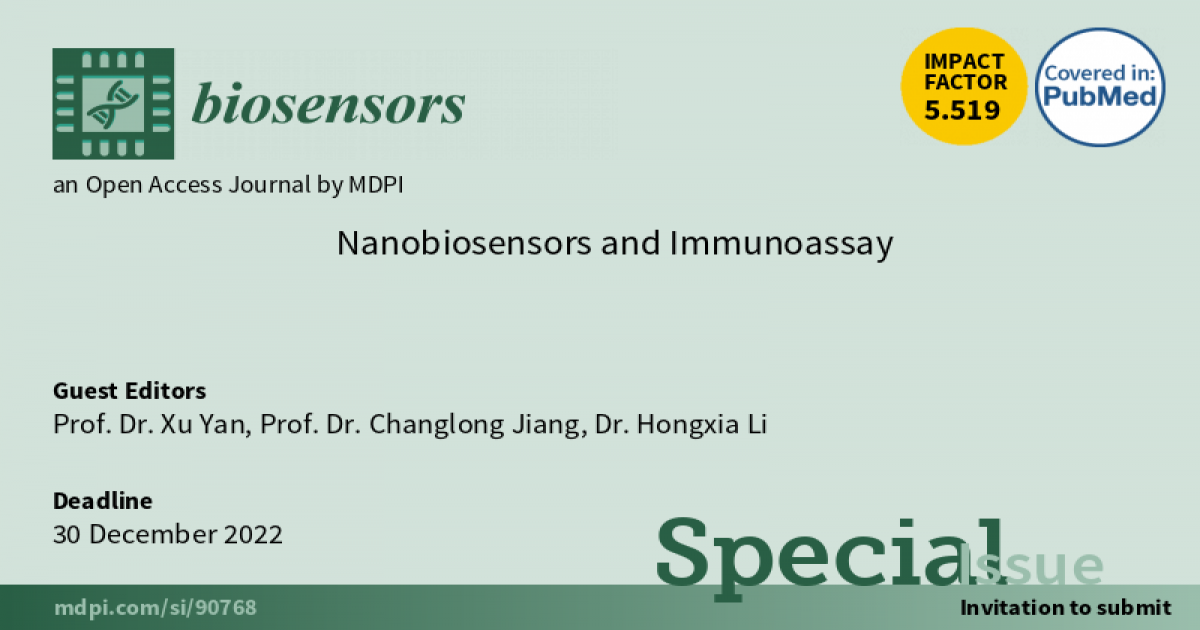- 5.6Impact Factor
- 9.8CiteScore
- 22 daysTime to First Decision
Nanobiosensors and Immunoassay
This special issue belongs to the section “Nano- and Micro-Technologies in Biosensors“.
Special Issue Information
Dear Colleagues,
The main topic of this Special Issue is the development of biosensors and immunosensors. In this regard, this Special Issue aims to collect original articles that present research advances in the design, fabrication, and application of high-performance (bio)sensors and immunosensors that implement new principles, strategies, methods, and technologies. Additionally, reviews reflecting the current hotspots, new challenges, and future perspectives of bio/immune-sensors in the important application areas are particularly welcome.
Nanobiosensors and immunosensors are considered to be efficient tools for a wide variety of analytical problems, including uses in medicine, biomedical research, drug discovery, the environment, food, process industries, security and defence. In this regard, interesting principles, strategies, and methods are being proposed to design, develop, and fabricate bio-/immune-sensors. Moreover, bio-/immune-sensors based on various sensing modes (optical, electrochemical, photoelectric, thermometric, piezoelectric, magnetic or micromechanical, etc.) and using various recognition elements (enzymes, DNA/aptamers, antibodies/antigens, molecularly imprinted polymers, etc.) are satisfying the growing needs of methods and devices for the rapid, reliable, and high-performance detection of targets (biomarkers, toxic ions, pesticides, veterinary drugs, pathogenic bacteria, antibiotics, toxins, organic pollutants, food additives, etc.).
Prof. Dr. Xu Yan
Prof. Dr. Changlong Jiang
Dr. Hongxia Li
Guest Editors
If you want to learn more information or need any advice, you can contact the Special Issue Editor Jessica Zhou via
Manuscript Submission Information
Manuscripts should be submitted online at www.mdpi.com by registering and logging in to this website. Once you are registered, click here to go to the submission form. Manuscripts can be submitted until the deadline. All submissions that pass pre-check are peer-reviewed. Accepted papers will be published continuously in the journal (as soon as accepted) and will be listed together on the special issue website. Research articles, review articles as well as short communications are invited. For planned papers, a title and short abstract (about 250 words) can be sent to the Editorial Office for assessment.
Submitted manuscripts should not have been published previously, nor be under consideration for publication elsewhere (except conference proceedings papers). All manuscripts are thoroughly refereed through a single-blind peer-review process. A guide for authors and other relevant information for submission of manuscripts is available on the Instructions for Authors page. Biosensors is an international peer-reviewed open access monthly journal published by MDPI.
Please visit the Instructions for Authors page before submitting a manuscript. The Article Processing Charge (APC) for publication in this open access journal is 2200 CHF (Swiss Francs). Submitted papers should be well formatted and use good English. Authors may use MDPI's English editing service prior to publication or during author revisions.
Keywords
- nanobiosensors
- immunoassay
- nanomaterials
- biomedical diagnosis
- public safety
- food industry
- environment mornitoring
- sensing platform
- point-of-care devices
- wearable equipment

Benefits of Publishing in a Special Issue
- Ease of navigation: Grouping papers by topic helps scholars navigate broad scope journals more efficiently.
- Greater discoverability: Special Issues support the reach and impact of scientific research. Articles in Special Issues are more discoverable and cited more frequently.
- Expansion of research network: Special Issues facilitate connections among authors, fostering scientific collaborations.
- External promotion: Articles in Special Issues are often promoted through the journal's social media, increasing their visibility.
- e-Book format: Special Issues with more than 10 articles can be published as dedicated e-books, ensuring wide and rapid dissemination.

